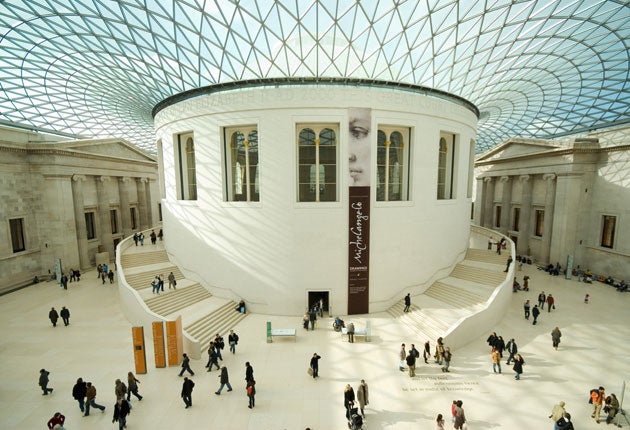Lord Sainsbury donates £25m to extension of British Museum

His uncle funded the multi-million pound Norman Foster-designed Sainsbury Centre for Visual Arts, while a brother donated an estimated £100m worth of paintings to the Tate and National galleries. And, along with his siblings, he has already given £50m to the British Museum.
Now the Conservative peer Lord Sainsbury of Preston Candover has donated a further £25m towards the British Museum in what is believed to be the largest individual cash gift to a British cultural institution for a quarter of a century.
The donation will go towards the Museum's £135m exhibition space for major shows and a state-of-the-art conservation centre, designed by Lord Rogers. Work on the glass and traditional stone extension is expected to start next spring and it will provide an exhibition space of more than 1,000 square metres .
Other donors to the project include the investment banker John Studzinski, who has contributed £5m. The £25m gift is trumped in recent decades only by the largesse of the late billionaire Sir Paul Getty who in 1985 gave £50m to the National Gallery and £40m to the British Film Institute.
With his most recent gift, Lord Sainsbury has become the figurehead for a wave of modern-day "austerity philanthropists". This group of wealthy figures is supporting the arts at a time when the arts face cuts of up to 40 per cent in state support. George Osborne, the Chancellor of the Exchequer, is expected to outline funding reductions in his spending review on 20 October. Other such austerity donors include Lord Browne, the former chairman of BP and chairman of the Tate, who has donated a seven-figure sum towards a £210m extension at the Tate Modern on London's Bankside.
The recession has, nevertheless, taken its toll on non-state funding. There was a dip in total private investment in culture last year, down from a record £686m in 2008, to £655m in 2009, according to figures released by the networking group Arts and Business.
And the British Museum itself has given warning that government support is "crucial" in order to secure donations. A spokeswoman said: "We know that the commitment from the government played a large part in moving this project forward," adding that philanthropists are offered "reassurance" by government backing of a project.
"The arts have always relied on private donations, a mixed model of public and private support," she said. "Lord Sainsbury committed to giving his support after the government had pledged their support of the project: if the Government had not offered their support, we may not have been given this donation."
Sir Nicholas Serota, the director of the Tate, has also issued a warning that the "extreme extremes that have been speculated upon" in government cuts would "impact on what [institutions] are able to do."
The Sainsbury family has a long history of donations to the arts. The construction of the Sainsbury Wing of the National Gallery, which opened in 1991, was financed by a £50m donation by Lord Sainsbury and his brothers, Simon and Sir Timothy.
Lord Sainsbury of Preston Candover, whose first name is John, has also recently donated £10m to a project extending Oxford's Ashmolean Museum and helped to finance the building to the Linbury studio theatre at Covent Garden's Royal Opera House.
His cousin, David, whose title is Lord Sainsbury of Turville, has donated to the Royal Shakespeare Company and the Sainsbury Centre for the Visual Arts at the University of East Anglia, which was founded by his father. Lord Sainsbury of Turville was a science minister in the last Labour government, and became the first person in the UK to give more than £1bn to charity.
Join our commenting forum
Join thought-provoking conversations, follow other Independent readers and see their replies
0Comments